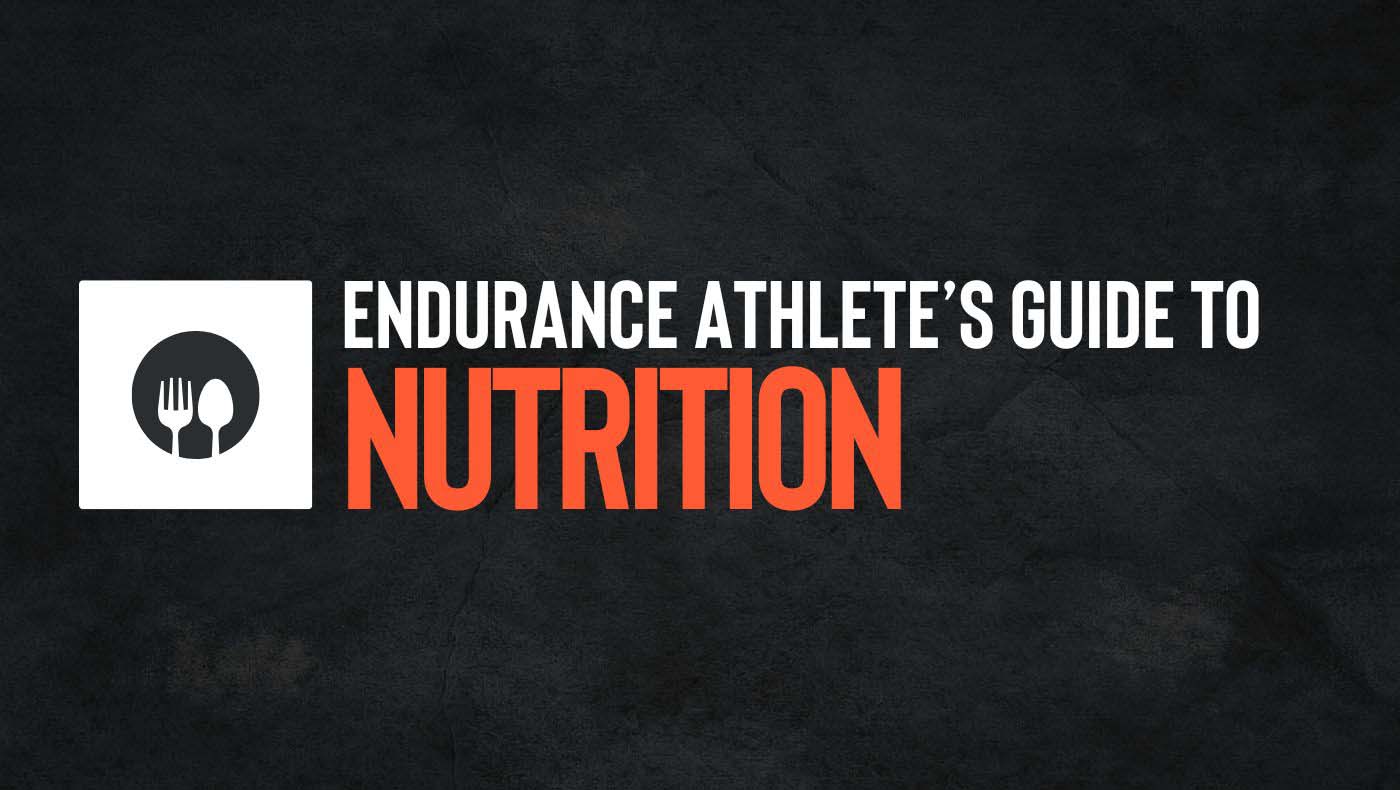
Nutrition for Endurance Athletes
The field of sports nutrition has evolved significantly in the past few decades. Where in the past nutrition was an afterthought, we now know that nutrition is key to achieving peak performance and sustaining results over extended periods of time.
As Ron Maughan, a leading sports nutrition expert, wrote in the Handbook of Sports Nutrition published by the IOC Medical Commission:
“It is no longer enough to rely on natural talent, hard training, superior equipment or a will to win… sound nutritional practices can make the difference between winning and losing, or between doing a personal best and just finishing the event.”
This holds true for amateurs as well as professional athletes. Sooner or later, every endurance athlete will realize the importance of nutrition for withstanding the rigors of training and achieving improvements.
The Four Stages of Endurance Nutrition
Endurance sports nutrition is incredibly complex. However, it can be divided into these four stages:
- Daily: What you eat every day to keep your body in optimal condition.
- Loading: What you eat in the days and hours before an endurance event.
- Fueling: What you consume during endurance exercise.
- Recovery: What you eat after exercise to help your body repair and recover.
Each of these stages requires its own nutritional approach. Before you dive into those nutritional strategies, it’s important to understand the nutrients that keep our bodies fueled during each stage.
Carbohydrates
Carbohydrates, along with protein and fat, are one of the three macronutrients. Providing four calories per gram, carbohydrates are the body’s primary source of fuel during endurance activity.
There are several types of carbohydrates. However, in regards to endurance sports, they are usually broken down into “fast” and “slow” carbohydrates.
Fast carbohydrates are the ones that our bodies break down and absorb quickly, providing a fast source of energy. Slow carbohydrates take longer to break down, providing a more sustained release of energy.
Why Adequate Carb Intake Is Important
Even though carbohydrates often get demonized, and many popular diets like Keto severely restrict them, carbohydrates are incredibly important for athletes.
When the body doesn’t get enough carbohydrates, it can start breaking down muscle for energy instead. The process is called gluconeogenesis and it’s a scenario that endurance athletes want to avoid as it can lead to muscle loss.
For more info, read: Endurance Athlete’s Guide to Carbohydrates
How Many Carbohydrates Do Endurance Athletes Need?
Daily:
Endurance athletes should follow a periodized approach to carbohydrate intake, meaning they adjust carbohydrate consumption to match the energy demands of training.
For example, during lighter phases of training, athletes should consume fewer carbohydrates to reflect their lower energy demands. For daily nutrition, athletes should focus on consuming slow carbs such as whole grains and high-fiber vegetables.
Loading:
In the 24-36 hours before an event lasting more than 90 minutes, aim to consume 10-12 grams of fast carbohydrates per kilogram of body weight.
Fueling:
During exercise lasting 1 to 2.5 hours, aim for 30 to 60 grams of carbohydrates per hour. For activities lasting more than 2.5 hours, aim for 90 grams of carbohydrates per hour.
For best absorption and to avoid gut distress, a combination of glucose and fructose in a ratio of 1:0.8 is recommended, which is why Nduranz uses this ratio in its fueling products.
Recovery:
To replenish glycogen stores after intense exercise, consume 1 to 1.2 grams of carbohydrates per kilogram of bodyweight, per hour, for the first four hours.
If consuming protein along with your carbohydrates during the recovery window, then 0.8-1g/kg of carbohydrates is adequate. After this period, return to normal carbohydrate intake.
Protein
Proteins make up approximately 20% of our body weight and are present in every cell, serving as vital components in our biological machinery. Each protein is composed of smaller building blocks called amino acids.
Of the 20 amino acids in the human body, nine are considered essential, meaning they must come from food, while the rest can be produced by the body. Additionally, there are “semi-essential” or “conditionally-essential” amino acids that the body may struggle to produce in sufficient amounts during times of stress, such as following intense exercise.
Why Endurance Athletes Need Protein
Most athletes know protein is crucial for building and repairing muscle. However, protein is much more than a muscle-repair tool. It is involved in almost every function in the body.
Think of the body as a skyscraper. Proteins aren’t just the beams and rivets holding the structure together, but also the engineers, construction workers, and maintenance crew putting everything together and ensuring it runs smoothly. Without proteins, the entire framework would collapse.
How Much Protein Do Endurance Athletes Need?
Daily:
Most adults need 1.2-1.4 grams of protein per kilogram of bodyweight per day. Endurance athletes typically have higher requirements of roughly 1.6-2.5 g/kg per day.
Loading:
Protein is generally not part of loading. You should limit protein intake to 1.6-1.8 grams per kilogram of bodyweight while loading.
Fueling:
Avoid eating protein during exercise as it can cause stomach issues. There is no evidence that consuming protein during exercise will improve performance or recovery, provided that carbohydrate intake before and during exercise is sufficient.
Recovery:
Aim to consume 20-30 grams of high-quality protein after training or competition to aid in recovery. There is no set window for consuming protein post-exercise.
However, it’s recommended to consume carbohydrates and protein together for recovery, and carbohydrates have a 30-minute recovery window.
Pro Fact: Chocolate milk is often touted as a recovery drink. It has a good balance of carbohydrates and protein, which can help replenish glycogen stores in the muscles and in the liver and repair muscle tissues.
Fats
Fat is the third macronutrient and has many roles, such as hormone production, providing structure to cell membranes, and aiding in the absorption of fat-soluble vitamins.
Not all fats are equal, though. Endurance athletes (and everyone else, for that matter!) should aim to consume “healthy” monounsaturated and polyunsaturated fats while limiting “unhealthy” saturated and trans fats.
Containing 9 calories per gram, fat contains more energy than carbohydrates. Despite this, fat is not considered a good source of energy for endurance exercise.
Why Fats Aren’t Used for Energy in Endurance Sports
When you consume dietary fat, the intestines break them down into fatty acids, which then get sent to the bloodstream where they can be used as energy. The process takes a long time, which is not ideal when you need immediate energy, such as during a race.
Further, fat metabolism is an aerobic process, meaning it requires oxygen. During high-intensity activity, the body switches to anaerobic metabolism so it won’t be able to metabolize fats, which is why carbohydrates are the body’s preferred energy source for endurance activities.
How Much Dietary Fat Do Endurance Athletes Need?
Daily:
Endurance athletes should consume 1-1.5 grams of fat per kilogram of bodyweight per day. If trying to lose weight, they can go as low as 0.8 g/kg.
Loading:
Avoid consuming fats during the loading phase because they can cause stomach issues during the event. Completely limit fats in the hours before the race.
Fueling:
Do not consume fat when fueling because it can cause stomach issues.
Recovery:
There are no specific guidelines for fat consumption post-exercise.
To put these amounts in perspective, one avocado has 22 grams of fat, a tablespoon of olive oil has 14 grams, and a tablespoon of peanut butter has 8 grams.
Fact Facts: One avocado has 22 grams of fat, a tablespoon of olive oil has 14 grams, and a tablespoon of peanut butter has 8 grams.
Hydration
In the world of endurance sports, hydration goes beyond just drinking water—it’s about maintaining the right balance of fluids and electrolytes. Hydration can be one of the trickiest aspects of nutrition to manage because sweat rate is highly individual.
There are also many factors that affect hydration, such as climate, heat acclimatization, medications, and diet. Even clothing choices can all influence how much fluid and electrolytes you lose during exercise.
For more detailed info, read our Hydration Guide.
How Much Water Do Endurance Athletes Need?
Daily:
The Institute of Medicine (IOM) recommends that healthy adult women consume 2.7 liters of water per day and healthy men consume 3.7 liters per day. These recommendations are for sedentary individuals. Athletes need to increase this amount based on their activity level.
Loading:
Glycogen binds with water, so you'll need to drink more water than normal during loading.
Fueling:
Water consumption during fueling depends on environmental conditions, sweat rate, and exercise duration. In general, aim to consume:
- 500ml of water per hour in temperate conditions
- 250ml of water per hour in cold conditions
- 750ml of water per hour in hot conditions
Recovery:
Start consuming fluids immediately after intense exercise and continue consuming until you are back to your pre-event weight. Sports drinks or other beverages that contain electrolytes are a good choice because they can help replenish lost electrolytes.
Micronutrients
In addition to macronutrients, endurance athletes also have higher demands of micronutrients. These are the vitamins and minerals essential for countless physiological functions such as collagen synthesis and transporting oxygen in the blood.
Think of micronutrients like the “support crew” during a long race. They don’t get as much attention as macronutrients, but are essential for making sure that everything runs smoothly.
To ensure you’re getting enough micronutrients, make sure your diet includes a variety of fruits, vegetables, whole grains, and lean proteins.
Ready to learn more? See our guides on Carbohydrates, Loading, Fueling, and Recovery.
